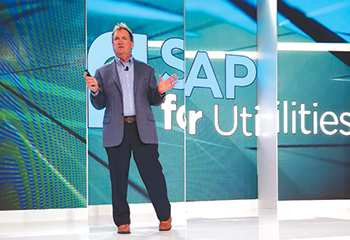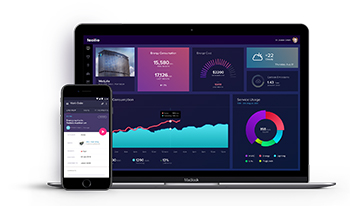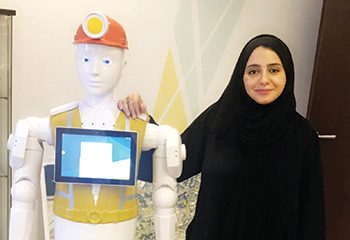
 Ramachandran ... focusing on efficient building management.
Ramachandran ... focusing on efficient building management.
US-based Facilio says its namesake facilities optimisation software leverages artificial intelligence (AI) and the Internet of Things (IoT) in real-time to offer unified facilities and sustainability management. It’s a world-first, it claims.
Facilio connects together the three integral parts of a building – people, sustainability, and machines – to help the built environment achieve continuous efficiency across portfolios.
The company started its operations in India, the Middle East and the US in 2018 at a time when the global smart buildings and facility management (FM) space is undergoing rapid transformation. According to research consultancy Verdantix, the software market in this segment is poised to grow to more than $7 billion by 2022.
 |
|
Facilio’s energy dashboard. |
In an interview with ABDULAZIZ KHATTAK of Gulf Construction, Prabhu Ramachandran, founder and CEO of Facilio, says efficient buildings management is becoming a critical need to meet Dubai’s smart city and sustainability goals.
“As Dubai actively gears up for Expo 2020, the strategic need of reimagining its built environment has come into sharp focus. Even at the government level, the benefits of advanced technologies like AI and IoT to optimally transform the way buildings and facilities are managed, is being recognised. As such, Facilio wants to be at the forefront of this transformation and help its customers to transition to tech-enabled modern facilities that are well maintained, efficient and sustainable.”
Ramachandran says technological innovations and automation is leading the transformation in the Middle East’s facililities management market. As per the latest Middle East FM Business Confidence Monitor 2018 report by BIFM, an international professional body for facilities management, a whopping 91 per cent of FM practitioners have said they would be using computer-aided facility management (CAFM) and technology to grow their business further. The same report also suggests that sustainability and IoT, and their convergence, will be the sweet spot FMs should be aiming for to maximise their gains.
“Facilio’s solution integrates both these components, and more, to deliver end-to-end building maintenance, operations, sustainability, and tenant experience, across portfolio, harnessing the power of IoT and AI,” he adds.
Traditionally, Ramachandran says facilities management in buildings has entailed high capital and operating expenditure, as well as long implementation cycles.
“Legacy automation systems and building management systems have been capital- and time-intensive to implement, as well as rigid in their structure due to multiple systems from multiple vendors functioning in isolation.
“The agility that a unified and centrally controlled system enables is something building owners and facilities managers were missing. Today, this agility has become an essential need for CREs (commercial real estate owners), to remain competitive and maintain their buildings as modern, smart, intelligent assets that are future-ready,” he says.
Ramachandran says research indicates that nearly five to six times more money is spent on operational costs than on construction costs.
“Therefore, the scope to realise return on investment (ROI) is tremendous if continuous efficiency can become the default standard of facilities management. And an AI- and IoT-enabled approach to FM does exactly that, helping building owners take the leap into the next frontier of facilities management – modern, experience-driven services,” he states.
Also, Ramachandran says traditionally FM in buildings comprises multiple disparate and siloed automation systems. And while all of these automation systems individually collected ‘big data’, no one ever collated and analysed this data across building portfolios and made sense of it to derive intelligence about the buildings performance. AI, he adds, brings context into this collected data in real-time. This enables several benefits, some of which include:
• Insight-led decision-making: Using the power of IoT, Facilio connects multiple existing automation systems together to centrally capture real-time data. Facilio further harnesses AI and machine learning (ML) capabilities to extract powerful insights from the goldmine of performance data, making existing legacy systems smarter. This helps buildings and FM to transcend into more predictive models of building performance. It also empowers commercial real estate owners and facilities managers with data-led decision-making and provides a holistic view of their operational efficiency, asset lifecycle performance and sustainability. This puts the customers in the driver’s seat to centrally control and drive the efficiency of their building portfolio, and can save buildings owners up to 30 per cent in operating expenses.
• Smart buildings, smart workforce: AI is essential as the backbone of FM to help it evolve to a smart and intelligent era. A predictive model is poised to become the de facto approach to managing facilities as it helps facility managers and building owners to shift gears from the legacy fire-fighting and reactive mode, into becoming value players that deliver a superior facilities experience to tenants and users, focused on their comfort and well-being. Facilio uses advanced machine learning algorithms to predictively detect equipment anomalies and automatically integrates a corrective resolution workflow with prescriptive AI-driven insights.
“Imagine the scenario of business outages due to machinery breakdown and the loss of revenue and inconvenience this entails for users. Powered with AI capabilities, machinery and assets will benefit from predictive maintenance that prevents breakdowns,” says Ramachandran.
“For example, if the temperature in the morning is 30 deg C in Dubai, it would take the air-conditioner about 30 minutes to bring it down to 24 degrees. However, if the same air-conditioner takes longer for the same job, our solution automatically alerts us to the fact that there is a problem with the centralised cooling system.”
Additionally, building FM is heavily workforce driven. There is tremendous scope to make the workforce smarter with tech-enabled solutions, which is a key part of being “smart”. Facility managers get empowered by a real-time AI and IoT-led approach leading to efficient workforce management and higher productivity.
• Sustainability: AI helps facilities and buildings to build sustainability into their core operations. IoT-enabled operations and energy intelligence helps optimise asset and sustainability performance in real-time, helping building owners realise multi-fold efficiency.
From a customer experience perspective, the buildings and FM space has so far not focused on the facilities experience.
Ramachandran says facilities often rely on a two-pronged strategy of scheduled and reactive maintenance. This often leads to unplanned costs, extended equipment downtime, and a facilities team focused on alarm chasing instead of providing seamless experience to its occupants.
“Thus smart building solutions like Facilio help commercial buildings focus not only on improving efficiency in operations and sustainability but also provide value-added services like tenant engagement applications and occupant portal,” he adds.
Ramachandran says with the role of facilities management changing rapidly, and building owners increasingly expecting facility teams to be stakeholders and collaborators for business growth, there is a shift towards highly efficient operations and an elevated occupant experience.
“A real-time, unified, and AI and IoT-led FM approach is the key to delivering that valuable experience to customers, and for owners and facilities managers to remain relevant and create value.”
Facilio’s advanced machine learning algorithms that predictively diagnose performance anomalies and use AI-driven capabilities help facilities achieve effortless and contextual operations.
Headquartered in Atlanta, Georgia, US, Facilio was founded by cloud and IoT veterans Ramachandran, Rajavel Subramanian, Yogendra Babu and Krishnamoorthi Rangasamy. Within a year of starting commercial product availability, the company has exhibited strong performance and market penetration across the Middle East, US, and India.








.jpg)




.jpg)




























.jpg)

































